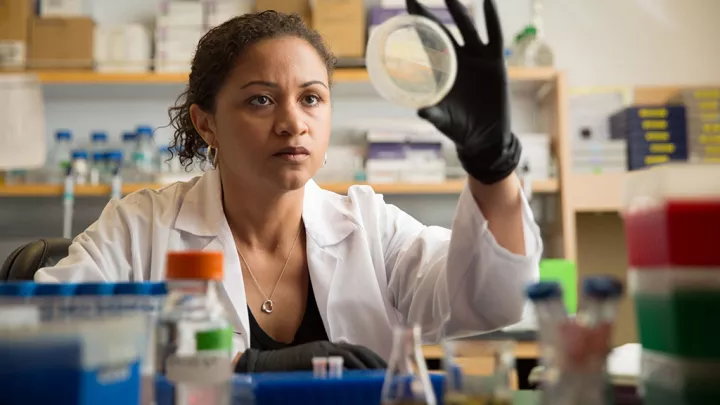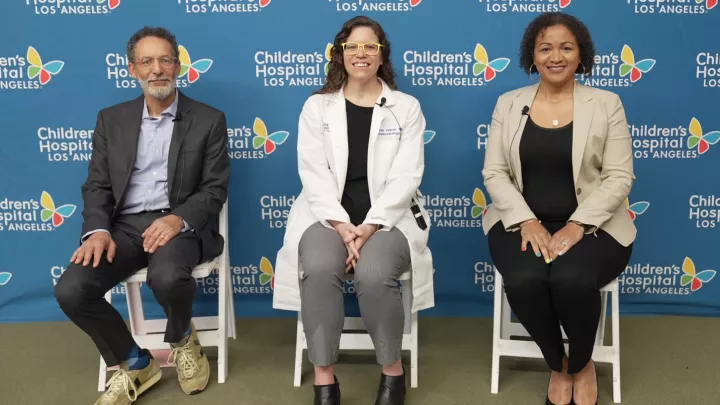
Senta Georgia, PhD
Georgia attended Stanford University, earning her BS in Biological Sciences, and dual departmental honors in Biological Sciences and Ethics in Society. She earned her PhD at UCLA in Molecular Biology.
Her dissertation focused on the role of cell cycle molecules in the establishment, expansion, and maintenance of beta cell mass. She was a postdoctoral fellow and assistant adjunct professor at the Hillblom Islet Research Center at UCLA.
Senta Georgia, PhD, is a member of the Division of Endocrinology at CHLA. Her research involves the regeneration of insulin-producing, pancreatic beta cells as a potential therapeutic for patients with type 1 diabetes. Her research on how the enzyme, DNMT1, is critical to stem cells differentiating into pancreatic beta cells was featured on the cover of the journal Genes & Development.
Education
PhD Molecular Biology, UCLA 2007
BS Biological Sciences, Stanford University 2001
Accomplishments
Developmental Biology and Regenerative Medicine Program at The Saban Research Institute of Children's Hospital Los Angeles
Publications
Fibroblast growth factor 10 alters the balance between goblet and Paneth cells in the adult mouse small intestine. Al Alam D, Danopoulos S, Schall K, Sala FG, Almohazey D, Fernandez GE, Georgia S, Frey MR, Ford HR, Grikscheit T, Bellusci S. American Journal of Physiology, Gastrointestinal and Liver Physiology. 2015 Apr 15;308(8):G678-90. doi: 10.1152/ajpgi.00158.2014.
Congenital proprotein convertase 1/3 deficiency causes malabsorptive diarrhea and other endocrinopathies in a pediatric cohort. Martín MG, Lindberg I, Solorzano-Vargas RS, Wang J, Avitzur Y, Bandsma R, Sokollik C, Lawrence S, Pickett LA, Chen Z, Egritas O, Dalgic B, Albornoz V, de Ridder L, Hulst J, Gok F, Aydoğan A, Al-Hussaini A, Gok DE, Yourshaw M, Wu SV, Cortina G, Stanford S, Georgia S. Gastroenterology. 2013 Jul;145(1):138-48. doi: 10.1053/j.gastro.2013.03.048.
DNMT1 represses p53 to maintain progenitor cell survival during pancreatic organogenesis. Georgia S, Kanji M, Bhushan A. Genes & Development. 2013 Feb 15;27(4):372-7. doi: 10.1101/gad.207001.112.
Skp2 is required for incretin hormone-mediated β-cell proliferation. Tschen SI, Georgia S, Dhawan S, Bhushan A. Molecular Endocrinology. 2011 Dec; 25(12):2134-43. doi: 10.1210/me.2011-1119.
Pancreatic β cell identity is maintained by DNA methylation-mediated repression of Arx. Dhawan S, Georgia S, Tschen SI, Fan G, Bhushan A. Developmental Cell. 2011 Apr 19;20(4):419-29. doi: 10.1016/j.devcel.2011.03.012.
Differential effects of prenatal and postnatal nutritional environment on ß-cell mass development and turnover in male and female rats. Matveyenko AV, Singh I, Shin BC, Georgia S, Devaskar SU. Endocrinology. 2010 Dec;151(12):5647-56. doi: 10.1210/en.2010-0978.
Pregnancy hormones boost beta cells via serotonin. Georgia S, Bhushan A. Nature Medicine. 2010 Jul;16(7):756-7. doi: 10.1038/nm0710-756. No abstract available.
Inconsistent formation and nonfunction of insulin-positive cells from pancreatic endoderm derived from human embryonic stem cells in athymic nude rats. Matveyenko AV, Georgia S, Bhushan A, Butler PC. American Journal of Physiology. Endocrinology and Metabolism. 2010 Nov;299(5):E713-20. doi: 10.1152/ajpendo.00279.2010.
Cyclin D2 is essential for the compensatory beta-cell hyperplastic response to insulin resistance in rodents. Georgia S, Hinault C, Kawamori D, Hu J, Meyer J, Kanji M, Bhushan A, Kulkarni RN. Diabetes. 2010 Apr;59(4):987-96. doi: 10.2337/db09-0838.
Research
Three million people in America have Type I diabetes, an autoimmune disease that destroys the insulin-secreting cells of the pancreas and results in an inability to regulate blood sugar levels. While insulin injections and other pharmaceuticals help patients manage their diabetes, there is no definitive cure. A potential cure for diabetes may be a cell replacement approach to replace lost insulin secreting cells. Currently, the only cell-based therapy for diabetes is islet transplantation, which is limited by an insufficient supply of islet donors, the requirement to be on long-term immunosuppression, and eventual reoccurrence of insulin dependence.
One way to overcome the challenges of islet transplantation would be to use a patient’s own adult stem cells to make new insulin-secreting cells. This approach would overcome limited donor supply, not require immunosuppression, and be able to be renewed if patients became dependent on insulin therapy in the future.
Visit the Georgia Laboratory.
Current Funding:
- K01 NIH/NIDDK - The 81 million Americans that are diabetic or are pre-diabetic suffer from the condition because the body's insulin-producing cells, either because of autoimmune destruction or the inability of the cells to function properly, are unable to maintain normal blood sugar levels. The studies in this grant are targeted to understand how functional insulin-producing cells normally reproduce themselves. Results from these studies will contribute to the design of therapies to generate more insulin- producing cells as an effective cure for diabetes.
Media
YouTube: ResearCHLA Media Day 2023
Future-Proofing Children's Health: Reducing the Impact of Obesity and Diabetes
YouTube: Dr. Georgia at ResearCHLA Media Day 2023
The Washington Post - New diabetes cases linked to COVID-19
CHLA Blog
5 Things to Know About COVID-19 Research
New Study Uncovers Spike in Life-Threatening Complication of Diabetes Type 2 During Pandemic


